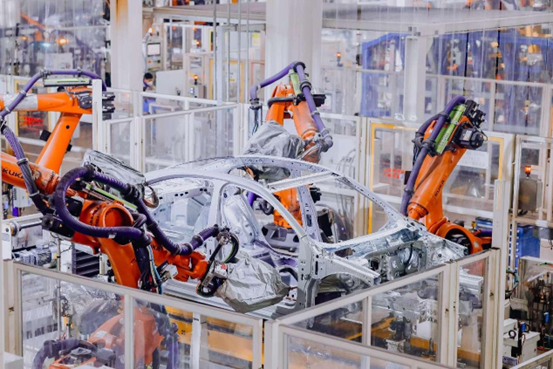By Wang Junling
In January this year, 4,588 new foreign-invested firms were established in China, up 74.4 percent year on year, said the country’s Ministry of Commerce (MOFCOM).
This surge demonstrates the rising enthusiasm of foreign investors in doing business in China, said the head of the MOFCOM’s Department of Foreign Investment Administration, adding that multinational companies are still optimistic about development opportunities in the Chinese market and doubling down on “investing in China.”
This point is well indicated by the 2023 performance in China recently released by a number of foreign-invested enterprises, as well as a series of investment expansion measures they have announced.
Many foreign companies reported remarkable performance in China last year. L’Oreal and Bosch both saw their sales in China grow by over 5 percent. Apple’s revenue from China accounted for about 1/5 of its total revenue. The sales of Merck & Co. in China surged 32 percent year on year to reach $6.71 billion…
“We remain confident in the resilience of the Chinese economy, and the growth opportunities in the Chinese mainland over the medium to long term,” said HSBC Group chief executive officer Noel Quinn.
Why did they achieved good performance in China?
On one hand, China’s vast market has played an indispensable role. Joe Bao, managing director of KONE Greater China, told People’s Daily that the Chinese market made a significant contribution to the company’s global performance last year.
China was the KONE’s largest single market in the fiscal year of 2023, accounting for about 26 percent of the company’s global sales, Bao added.
“China is the world’s largest new elevator market and the country with the most elevators in operation. Notably, 95 percent of the elevators currently in use in China have been installed for less than 20 years. This means that there is tremendous growth potential in the Chinese market for elevator maintenance and upgrading,” Bao said.
On the other hand, China’s continued opening-up policies have demonstrated their appeal. “In 2023, sales in the Chinese market continued to grow and the market ranked among the top ten globally for Karcher. In particular, sales of Karcher’s steam cleaners and window vacuums continued to rise,” said Rainer Kern, vice general manager and CFO of Karcher China.
In Kern’s view, the favorable investment environment, robust supply chain, rich talent pool, stable social environment, and continuously introduced preferential policies in China have provided strong support for companies’ development in the country.
Many enterprises have benefited from the 24 specific measures to further optimize the foreign investment environment and intensify efforts to attract foreign investment since they were introduced, Kern noted.
Among them, tax incentive policies and visa-free entry for personnel from multiple European countries have directly helped companies reduce operating costs and enhance international technological cooperation, Kern said.
Li Hongtao, associate research fellow with the Chinese Academy of International Trade and Economic Cooperation under the MOFCOM, pointed out that in recent years, China’s economy has been accelerating its upgrading driven by innovation.
The abundant innovation scenarios, platforms, and elements have provided multinational companies with brand-new opportunities for the R&D and sales of new products, enabling them to better seize first-mover advantages in the global market, Li explained.
An increasing number of global enterprises are committing to growth in China. The largest development center of German carmaker Volkswagen Group outside Germany commenced operations in January 2024. Meanwhile, U.S. energy giant ExxonMobil plans to invest 10 billion yuan ($1.4 billion) in a project in south China’s Guangdong province this year.
A survey by the Japanese Chamber of Commerce and Industry in China showed that most Japanese companies in China were satisfied with the business environment; a survey by the American Chamber of Commerce in China revealed that half of the respondents considered China as their first or among the top three global investment destinations; a report released by HSBC in 2023 indicated that 87 percent of the international companies interviewed planned to increase their operations in China….Foreign enterprises’ enthusiasm in doing business in China remains high, primarily because they are optimistic about the future prospects here.
Joan Zheng, vice-president of Tyson China and South Korea, noted that the American multinational corporation has seen double-digit growth in both of its sales in and imports from China in each of the recent years.
“China is not only continuously promoting industrial upgrading, but has also been striving to create a better business environment for foreign investors. This helps us gain more competitive advantages in vying for consumers and enhancing added value,” Zheng said.
From the beginning of this year, Tyson’s revenue in China has significantly exceeded the targets set by the headquarters, Zheng told People’s Daily.
The Chinese market has always been one of the most closely watched and continuously growing overseas markets for Tyson, and the company will continue to expand its investment in China, She said.
Li said that in 2023, final consumption expenditure contributed 82.5 percent to China’s economic growth. The constantly expanding and upgrading consumption demands of a population of over 1.4 billion provide multinational companies with a vast market space. At the same time, with its modernized infrastructure, comprehensive industrial system, strong supporting industrial capabilities, and high-quality talent pool, China can offer foreign-invested enterprises with efficient production and logistics solutions while reducing operating costs.
“It can be said that the consumption and industrial upgrades brought about by China’s high-quality economic development are continuously creating new opportunities for foreign enterprises,” Li noted.













